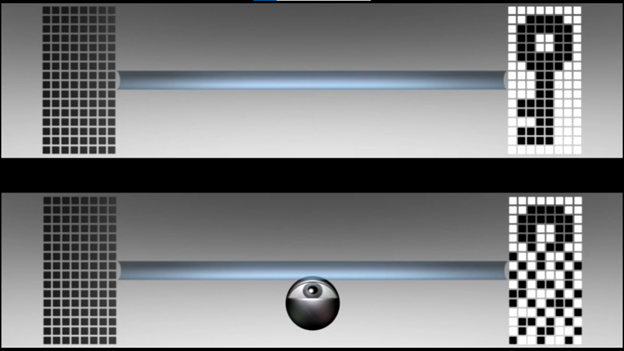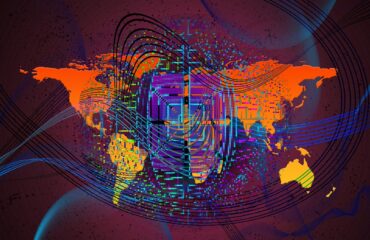
Quantum technologies will enhance automated military systems. The Switchblade 600 automated system is a tube-launched drone weighing 33 pounds that can reach speeds up to 115 miles per hour with a range of 29 miles and can “fly, track and engage non-line-of-sight targets,” according to manufacturer AeroVironment. Its “wave-off and recommit capability allows operators to abort missions and re-engage as required.” Image: AeroVironment, as published in National Defense.
By James Myers
This article is part of The Quantum Record’s ongoing series on Quantum Ethics, with six issues introduced in our May 2024 feature Quantum Ethics: There’s No Time Like the Present to Plan for the Human Future With Quantum Technology.
The military industry publication Army Technology states that “Quantum technology is at the forefront of most advanced nations’ long-term defence planning,” with the United States, China, and NATO making the major commitments to date.
To gain battlefield advantage, militaries are investing in quantum computers for their superior speed and accuracy in simulations and calculations of probabilities. Military spending on quantum sensing technologies is also ramping up, with the goal of improving detection of enemy submarines, aircraft, and troops, as well as reducing reliance on GPS technology that uses radio signals increasingly subject to interference and jamming in disputed areas.
As highlighted in our December 2023 article Quantum Sensing’s Revolutionary Potential for Cancer Treatment, Navigation, and Precision Measurement, quantum sensors are being developed with the capability for extremely accurate measurement, which could provide a decisive military advantage. One type of particularly sensitive measurement is required in synchronizing the atomic clocks used in the U.S. military’s GPS satellites.
It is possible that a combination of quantum sensing and inertial measurements from sources like accelerometers and gyroscopes could replace GPS altogether.

University of Maryland graduate student John Hannegan adjusts photon collection optics in preparation for linking trapped ions in the quantum device at the U.S. Army Research Laboratory with another quantum lab. Image: U.S. Army
As reported by the Journal of the Joint Air Power Competence Center (JAPCC),
“Quantum magnetic sensors are under development for detecting metallic objects generating local magnetic anomalies, such as mines, improvised explosive devices, submarines, camouflaged vehicles, and rotating machinery through walls. They can also serve as an alternate method of underwater navigation. Quantum gravimeters are under development for underground surveillance systems and are tested for detecting underground structures such as caves, tunnels, bunkers, research facilities, or missile silos.”
Secure, fast, and high-bandwidth communications are naturally another area of concern for militaries.
In our recent feature, Race for Post-Quantum Cryptography, we reported on pending new standards to replace current cryptographic methods like RSA and prime number factoring that can be broken by criminals and enemies using a quantum computer. Militaries have been active participants in the process to establish standards to maintain secure data in a post-quantum world.
Work is continuing in developing communications systems using quantum key distribution (QKD). QKD encodes information by taking advantage of the fact that it is impossible to clone, or copy, a quantum state, thereby preventing eavesdroppers who would alter a communication that they attempt to intercept.

Quantum key distribution illustration captured from a video by Toshiba , demonstrating how a sequence of inputs producing a key, in the top half of the illustration becomes undecipherable when observed by the eye, in the bottom half.
Although QKD communications are still subject to threats from insiders and denial of service attacks, China has been particularly active in QKD development and testing. Of concern to its military adversaries like the U.S. is that China is the first country to have launched a quantum communications satellite and the only country with demonstrated technical capability in long-distance quantum communications networks.
The North Atlantic Treaty Organization (NATO) military alliance has launched a program called Defence Innovation Accelerator for the North Atlantic (DIANA) to coordinate technological development with start-up companies, funding, mentoring, and testing facilities within the 32 national members of the alliance. Army Technology reports that “DIANA’s conceptualisations of quantum underwater warfare, inertial navigation and chemical detections have been widely used as benchmarks for the technology’s military applications.”

The U.S. Department of Defense is headquartered at The Pentagon, in Washington. In 2022, the DoD was the world’s largest employer, with 1.34 million active service members. Image by Touch of Light, from Wikipedia .
In 2022, the United Kingdom’s Department of Defence acquired the UK Government’s first quantum computer and identified 22 possible use cases for the technology.
The first two cases tested were aimed at answering the questions ‘where is the best place to put communications assets to ensure a resilient network?’, and ‘how to best use limited resources, given their constraints, against a to-do list?’ As stated by the Department of Defence, “These are both examples of solving problems that rapidly scale to a complexity beyond the capability of humans or classical computing solutions.”
From the test results, the Defence Department concluded that, “In the case of resource allocation, the problem is already extremely complex, trading off objectives, different resources, varied tasks and appropriate timing to reach each solution successfully. Owing to its complexity, this is a task that needs the balance of computing and human experience. The team therefore challenged humans to beat the hybrid classical/quantum solution. The feedback from this test was simple: today’s quantum computers make decision-making better and faster.”
Ethical Concerns are Raised in Military Use of Quantum Technology.
The ability of quantum technology to detect enemy assets, to advance secure military communications, and outpace human decision-makers raises significant ethical questions.
As Dr. Gus Skorsburg points out in a Perimeter Institute lecture, “What are the most important decisions people will make in their lives? The fact that those decisions now are very much mediated by tools powered by artificial intelligence and machine learning makes it seem to me that AI and ethics are inextricable. We can’t really think about what it means to live a good human life now by ignoring AI.”
Co-Academic Director of the University of Guelph’s Centre for Advancing Responsible and Ethical Artificial Intelligence, Dr. Skorsburg uses the acronym PROBES to highlight six key ethical issues in AI: Privacy, Responsibility, Opacity, Bias, Equity, and Sustainability. Some of these may be of particular concern in military use of quantum technology, perhaps especially responsibility, opacity and bias when, as the UK Ministry of Defence states, “today’s quantum computers make decision-making better and faster” than humans would otherwise.

The U.S. Defense Department’s Replicator Initiative seeks to integrate and automate technology throughout the military. Pictured are Deputy Defense Secretary Kathleen Hicks and an example of automated drone at the Defense Innovation Unit in Mountain View, California. Photo by Navy Petty Officer 1st Class Alexander Kubitza, Department of Defense.
Automation of military functions is a key tenet of the U.S. Government’s recently-announced Replicator Initiative, as we reported in our February feature, Military Funding of AI Education: What Does the Future Hold for Today’s Students?
The Replicator Initiative aims at “integrating sensors and fusing data across every domain” of the military, as explained by U.S. Deputy Defense Secretary Kathleen Hicks, who stated that the development of autonomous systems will counter China’s “biggest advantage, which is mass. More ships. More missiles. More people.” Noting that, “This is about mastering the technology of tomorrow,” Hicks stated, “After all, we don’t use our people as cannon fodder like some competitors do.”
The questions of ethics in military use of quantum technology have not entered into public discussion, in part owing to the technology’s complexities and unresolved technical issues which are not widely understood.
There are, however, existing examples of ethical issues that could easily be applied in a quantum context. In his lecture, Dr. Skorsburg uses the real-life example of automated military drones that make errors in targeting civilians instead of soldiers. When these tragic errors already occur with existing technology, we might imagine the increased rate and risk of such errors when decisions are being made far more rapidly by quantum technologies without sufficient time for human oversight.
The ethical issues could, however, have an opposite side, with the potential of quantum technology to improve defence and deter aggression.
Either way, however, it seems clear that advances in sensing, communication, and probability simulation will increase military capacity and therefore risks, and the outcomes will depend greatly on the wisdom and diplomatic capabilities of the national leaders who hold the power of the developing technology in their hands.
To explore other issues in quantum ethics, see our June 2024 feature, Race for Post-Quantum Cryptography: Will Proposed Encryption Standards Secure the World’s Data?



